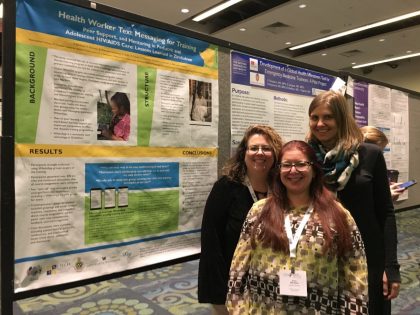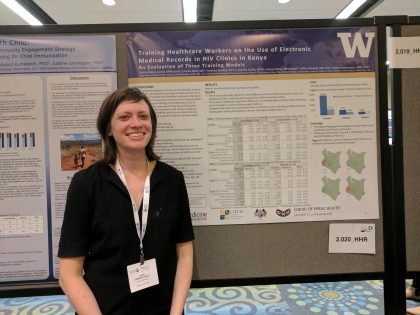
On April 6, the International Training and Education Center for Health (I-TECH) headed to the 8th Annual Consortium of Universities for Global Health (CUGH) Conference in Washington, D.C. I-TECH Zimbabwe presented among many colleagues in the University of Washington’s Department of Global Health, including staff of the department’s E-Learning Program (eDGH), which has worked closely with I-TECH on a number of e-learning and blended learning training programs.
This year’s conference theme was “Healthy People, Healthy Ecosystems: Implementation, Leadership & Sustainability in Global Health,” and I-TECH’s entries highlighted its sustainable workforce development work worldwide.

I-TECH Zimbabwe’s Vivian Bertman shared results on the use of text messaging as a low-cost, sustainable platform for building health care worker skills and knowledge to care for children and adolescents with HIV.
The research, titled “Health Worker Text Messaging for Training Peer Support, and Mentoring in Pediatric and Adolescent HIV/AIDS Care: Lessons Learned in Zimbabwe,” assessed the use of WhatsApp in a blended learning program. Participants used the app for peer-to-peer learning and support, generating over 300 entries, continuing discussions after course completion, and creating spin-off groups, including a support group for teens.
Highlighting the flexibility of cost-effective e-learning approaches was an oral presentation by eDGH’s Leslie Wall and Anya Nartker titled “No internet? No problem! Creative approaches to cost-effective e-learning delivery in resource-constrained settings.” The research looked at five tablet-based training programs developed by eDGH, in partnership with I-TECH, and delivered in Namibia, Tanzania, and Zimbabwe.
For participants, time spent off the job decreased from four days to less than one day, and within training programs that used text messaging to keep learners engaged, all participants finished in the time allotted. The team plans to expand learning activities and incorporate additional real-time interactions via text-message-based discussion groups or added face-to-face interactions.

Caitlin O’Brien-Carelli, an MPH graduate from the UW Global Health program, explored additional sustainable training models. O’Brien-Carelli presented her MPH thesis work on behalf of I-TECH: “Training Healthcare Workers on the Use of Electronic Medical Records in HIV Clinics in Kenya: An Evaluation of Three Training Models.”
During I-TECH Kenya’s first years of training health care workers to use the KenyaEMR system, the team adjusted its training from 5 days to 3 days, and moved the training from off-site to on-site, to increase sustainability and maintain effectiveness. Results confirmed that with the adjustments, training quality was maintained, more people in more facilities were trained, and costs were reduced significantly.
Detailing innovations on the operations front, I-TECH HQ Managing Director Rob Lindsley presented at a conference satellite session titled “Global Operations 2017: Tools for Faculty & Administrative Leaders.” Lindsley’s presentation, “It’s About How Hard You Can Get Hit and Keep Moving Forward: Global Support and PLC Registration in India,” outlined I-TECH’s complicated, creative pathway to country office registration in India.